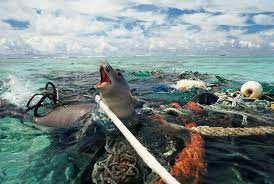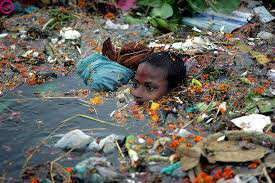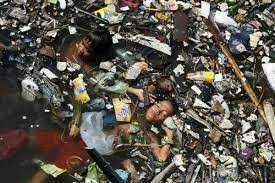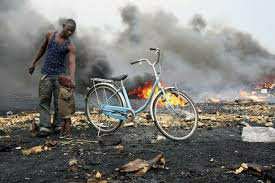The environment is threatened by the actions of man, the industrial and economic development of nations have influenced the deterioration of living conditions on Earth.

Among the organizations that are responsible for measuring the impact of man on the environment is Worldwatch Institute, who make an annual report of environmental damage to the planet.
According to environmental organizations and ecologists the situation of the Earth is unsustainable, but in what way does the man threaten the planet? How does it destroy entire ecosystems and put an end to the biodiversity of the Earth?
.jpg)
The threats to the environment vary but can be collected those that cause the most impact include the following:
The use of energy
The extraction of oil is alarming, costly and its spills damage the environment. The easy-to-extract, low-cost fossil fuels are hard to find. "Our economic systems are programmed to squeeze an increasing volume from an increasingly threatened planet," explains researcher Michael Renner.

The accelerated economic growth
"Although economic growth provides higher living standards and employment for many people, besides tax revenues for governments, it is achieved at the expense of depleting soils and aquifers, degrading lands and forests, polluting rivers, seas and the oceans, disturbing the carbon, nitrogen and phosphorus cycles and other negative repercussions, "point out Peter A. Victor and Tim Jackson.
Biological diversity promotes tourism in the regions
By avoiding immobilized assets we threaten the environment
The best known case is related to fossil fuel reserves: oil, natural gas and coal, which are left underground due to international policies on climate change.

According to estimates, a carbon budget that limits the increase in global average temperature to 2 degrees Celsius requires that 80 percent of fossil fuel reserves remain underground and not be burned, which would turn them into immobilized assets.
Deteriorating agricultural resources
The United Nations Organization for Food and Agriculture (FAO) estimated that agricultural demand is increasing, however water shortages are increasing in regions such as China, India, North Africa and the Middle East. At present, some 805 million people are chronically hungry and it is projected that by 2050 the figure will increase by 36 percent.

Food waste must be reduced, water productivity must be increased through water efficiency mechanisms, and through reduced production of meat and biofuels, among other measures.
The deterioration of the oceans
The oceans are threatened by overfishing and unsustainable fishing, in addition to the problems caused by climate change, the survival of the human being depends on the health of the seas.
Warming in the Arctic
The warming of the Arctic is accompanied by a growing economic and political interest in the area. The transnationals are betting on the melting of ice to increase the possibilities of navigating and extracting resources, particularly fossil fuels.

The Arctic becomes one of the most important battlefields in the climate war. The sustainability of this area requires recognizing the capacity and right of the local population and indigenous peoples to make their own decisions about development and conservation.
They denounce that Tlcan affects the Mexican environment
The transmission of diseases from animals to humans
Measles, smallpox, bubonic plague and yellow fever are some of them. Due to population growth and changes in land use human settlements are closer to wild populations of animals, and exposure to infectious diseases is increased.
About two-thirds of human infectious diseases such as AIDS, avian influenza and Ebola originate in animals: more than 60 percent of the 400 new human infectious diseases that have appeared in the last 70 years, say Catherine C. Machalaba, Elizabeth H. Loh, Peter Daszak and William B. Karesh.

Migrants and refugees
Climate change causes a certain degree of emigration, both voluntary and forced displacement. According to François Gemenne, meteorological disasters displaced some 140 million people between 2008 and 2013.
Addressing the problems caused by climate change, such as drought, famine and disease, can reduce obstacles to the migration of the most vulnerable population, as well as improve the reception capacity of the destination areas and enable a fluid integration of the emigrants.
Good post, it is necessary that human beings become aware of the damage we cause also affects us ourselves
the difficult thing is to believe that with promises everything will come true, the good politician speaks with his actions and then promises, but we must come to his reason because then it will be too late ...